I love romantic comedies. They’re one of my favorite genres. I grew up watching them with my mom and grandmother; one of the first I remember watching is P.S. I Love You. Sappy, adventurous, predictable and unpredictable alike, there are few romantic comedies I haven’t met, or haven’t liked.
Sometimes it seems they blend together, following similar formulas to concoct the typical rom-com. However, it’s the ones with an unusual aspect to it that stick out for me. Plenty of them contain that unusual aspect; at least in my opinion. I love rom-coms with memorable quotes, settings in foreign lands, grand gestures of love, and of course, the comedy. I love corny, but I also love slapstick.
Rom-coms are my go-to for fun and easygoing movie marathons. They make me laugh; they teach me things, they give me escapism. Most of all, they renew my belief that anything is possible, and that love is a powerful and beautiful thing. Love isn’t always perfect, but it’s worth it in the end.
When In Rome
When In Rome is a good example of watching the lead character, Beth (Kristen Bell) turn from a cynic to a believer. She meets the man of her dreams, Nick (Josh Duhamel), at her sister’s spontaneous wedding in Rome, one of the most romantic places in the world. Her sister is far more into romance and definitely more impulsive than Beth is. Beth wants to believe, but she’s more career-focused and just when she starts to open herself up to the possibility of being with Nick, she sees him kissing another. Instantly the walls are up again, but that doesn’t last long.
In many ways, Beth is forced to believe in love again. In its power, its capabilities, its emotion and its impact. Love changes a person. Beth is insecure, feeling as though love has scorned her one time too many. I can understand where she’s coming from, but it’s also a sad thing because the way she handles things initially, she doesn’t allow herself any real opportunities in finding happiness for herself. I find it to be good karma that she took the coins from the fountain, thus starting her zany adventure.
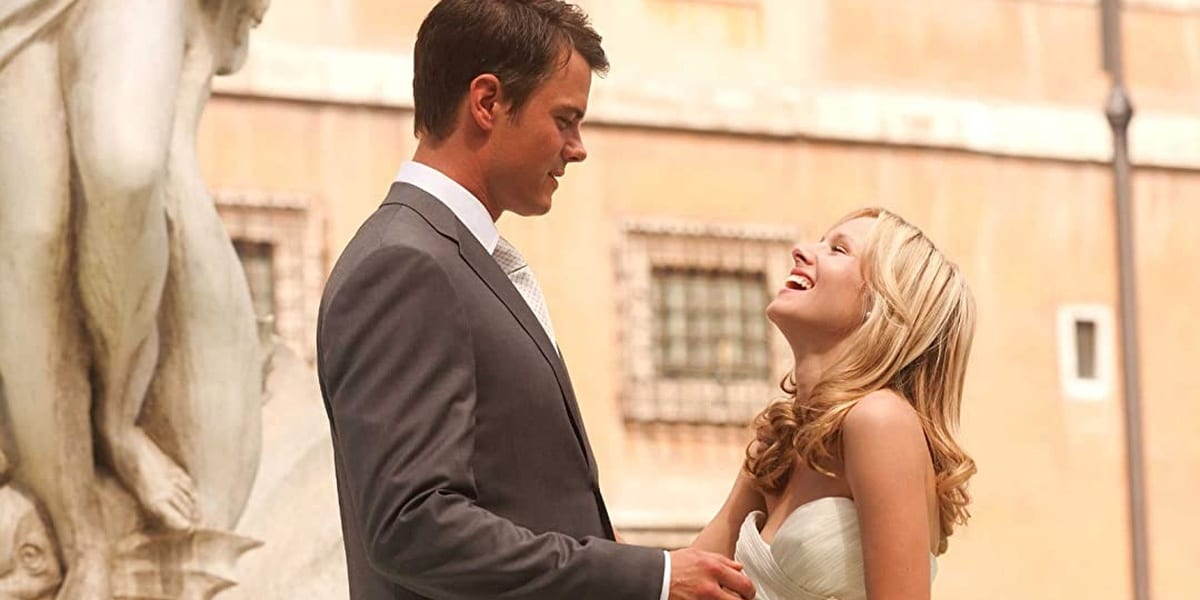
Being pursued by four very different guys out of nowhere is definitely overwhelming, but also flattering. In a way, it opens Beth’s heart and gets her to believe in love somewhat, but it’s also discouraging because all four are under a spell given she took their coins from the fountain–meaning none of it is real. However, it’s hilarious to watch the four men try to impress Beth in their own unique ways, especially when she’s dining with Nick in the dark and all four decide to crash it. Poor Nick is just caught up in all the chaos, and Beth initially believes he’s under the same spell, though she truly loves him.
My favorite part of the movie is near the ending when she crams in with the other four guys in the tiniest yellow car, desperate to get to the Guggenheim. It’s one of the most hysterical things I’ve ever seen. Watching Beth race after the last coin, stopping when it reaches Nick, is also one of my favorite moments. It’s the moment she realizes Nick was never under the spell; however, at their wedding, that realization is challenged when it turns out it was the wrong coin, leading Beth to believe Nick is still under a spell. That twist is something I haven’t seen in many rom-coms; the first time I watched it, I was devastated, so I could imagine what Beth must have felt running out of the church.
The lesson there, however, is that you have to believe when it’s love. Love, in many ways, is a fantasy. It’s a never-ending fairytale with the right person beside you. Beth let her insecurities get to her; it’s only when Nick proves he never threw in a coin, and thus was never under any spell, that Beth finally believes him. She should’ve believed him–believed in him–all along. It’s a great lesson, and it’s also an excellent ending.
The Holiday
I have to be honest: I cared more for Kate Winslet’s storyline in this movie than Cameron Diaz’s. I love the movie in its entirety, but for me, I find the story of Iris Simpkins (Winslet) more touching. She’s had a rough go of finding love. The man she loved has never treated her right, and she punished herself for years, wondering what it was she was doing wrong. It’s the best decision she ever made to leave England for the holidays, opting for an escape to sunny California.
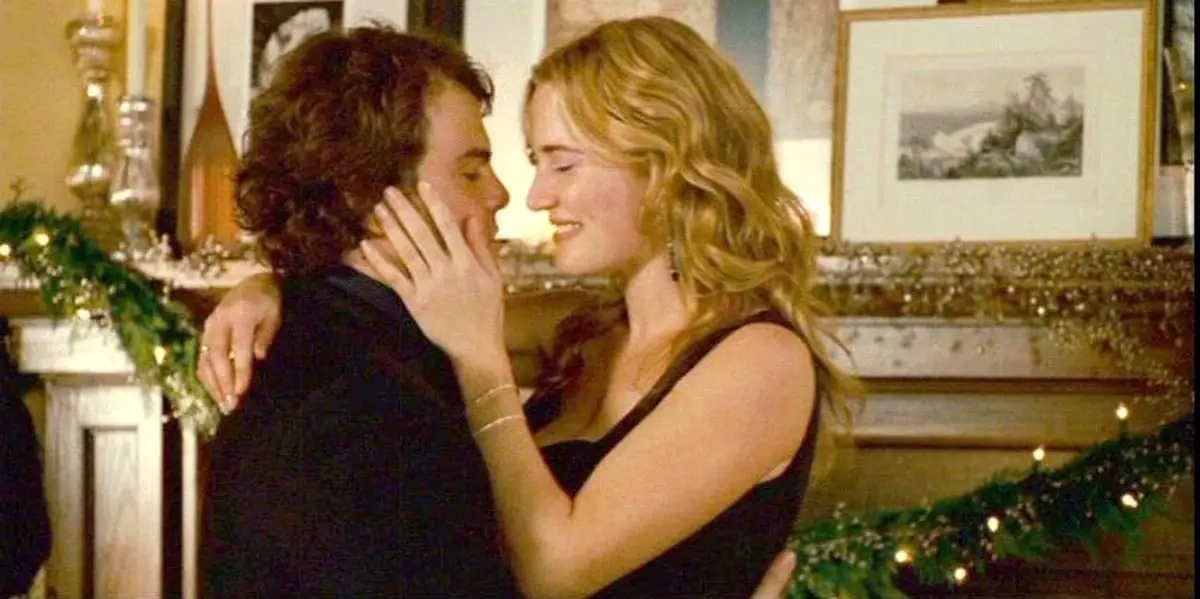
Iris’s friendship with elderly screenwriter Arthur Abbott is absolutely sweet and touching. They help each other, bettering one another’s lives. Arthur suggests Iris watch several movies with compelling female characters, encouraging her to be “the leading lady” in her own life. The films help, but it’s Arthur’s friendship that reaffirms Iris with confidence and grants her the “gumption” that she had in her all along to finally stand up to her ex-boyfriend and retake control of her life. She finally gets to heal and is granted a new start, and when she least expects it, she finds love in the form of Miles (Jack Black).
Miles is goofy and loveable, and a film composer. He’s creative and fun and lighthearted, all the things that Iris loves and needs. The two don’t rush into things, instead taking their time, but it’s clear they have irresistible chemistry. Miles, in turn, finds Iris at the right time, breaking up with his cheating girlfriend and finding solace in Iris’s company as she can relate to his woes. They are there for one another as friends first, and that builds the foundation of their budding relationship. Iris came to California alone and brokenhearted, but leaves with new and wonderful people in her life, a budding romance, and a healed heart. It’s inspiring, it’s rejuvenating for the soul (broken or not), and it’s a beautiful love story.
50 First Dates
Drew Barrymore and Adam Sandler have a chemistry like no other. They are the epitome of the rom-com, combining comedy and romance, sweet and sarcastic, happy and sad all in one.
As Drew’s character Lucy suffered a head injury prior to the events of the film, she now has a problem retaining any new information in her memory. Adam’s character Henry is a womanizer, preparing to take a trip to study walruses, and hence doesn’t make any serious commitments.
The moment he meets Lucy, sparks fly. The thing about 50 First Dates is that both Henry’s and Lucy’s lives become better having met each other. Henry’s womanizing ways are cut practically cold turkey upon meeting Lucy, as even though he usually avoids locals, he can’t stay away from her. Meanwhile, because of Lucy’s condition, her family and friends believe she won’t get to live a normal life because she’ll never remember her significant other, among other things.
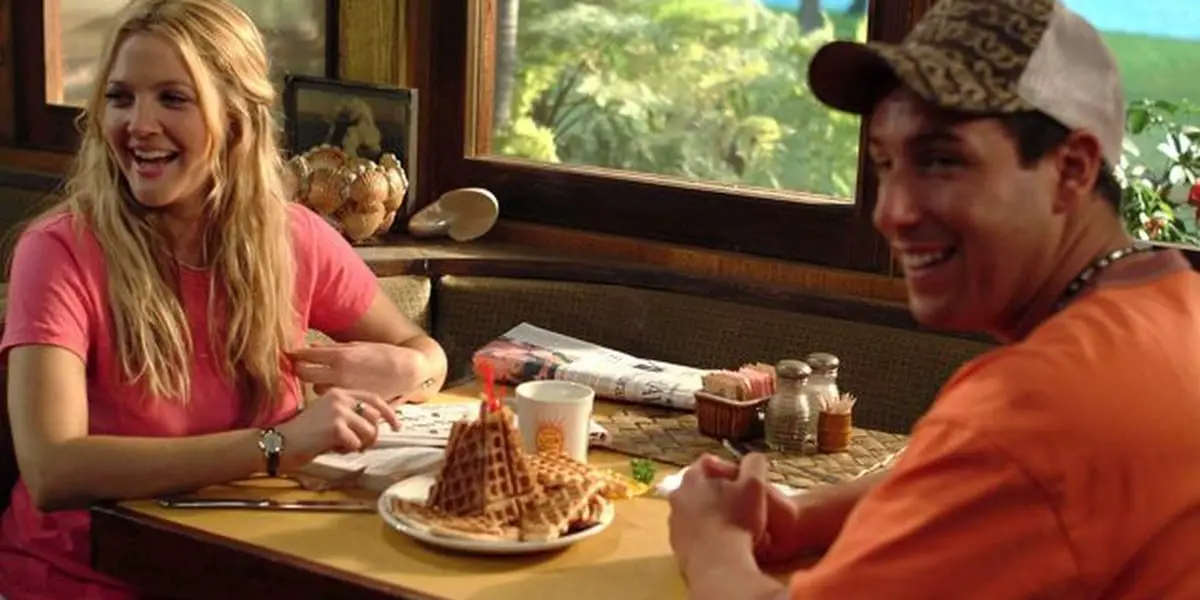
Henry’s dedication to making the impossible, possible is admirable and shows just how much he really cares for Lucy. In turn, Henry’s life feels complete, having found his soulmate. It’s romantic, how Henry finds new ways to get Lucy to fall in love with him each day–their lives will certainly never be boring–and the fact that Henry tries so hard and never complains proves that he was the one for Lucy all along and that they are meant to be together.
Though Lucy can’t remember Henry, I loved the fact that she dreamt about him and utilized her artistic ability to paint and draw his face, over and over again, in her studio. She loves him, otherwise she wouldn’t have anything.
The film had many uproarious supporting characters as well, in the forms of Henry’s friend Ula (Rob Schneider), Lucy’s brother Doug (Sean Astin) and her father Marlin (Blake Clark), Sue (Amy Hill), a friend of Lucy’s and her late mother’s, Nick (Pomaika’i Brown), a chef at the Hukilau Café, Henry’s assistant Alexa (Lusia Strus) and Ten-Second Tom (Allen Covert). The entire cast worked wonderfully together, bringing comedy in the best ways. I have to admit, one of the funniest parts of the movie, at least to me, is when Henry’s devised scheme to get Lucy’s attention out on the road goes hilariously wrong as he feigns being beaten up by Ula, and Lucy goes after the poor guy with a baseball bat. Sometimes Henry can get her to fall in love with him, sometimes he fails, and sometimes, he just gets his friends beaten up.
50 First Dates is a beautiful story, and it takes place in Hawaii, which has some of the most stunning scenery in the world. It’s romantic, it’s funny, it has that moment where things don’t look like they’ll work, but they end up working out in the best way. Even when love doesn’t seem possible, it still comes through, and Lucy and Henry get a happy ending and a great love story from it all.
The Philadelphia Story
Katharine Hepburn, Cary Grant, and James Stewart in one movie is bound to be a timeless classic. I was entranced with the film even from its first few moments. Katharine Hepburn’s character Tracy holds herself and everyone else to high standards, expecting nothing less than absolute perfection. She’s about to marry George (John Howard), but when her ex-husband Dexter (Grant) unexpectedly appears, along with reporter Mike Connor (Stewart) and a photographer, Liz (Ruth Hussey), Tracy’s world is shaken up.
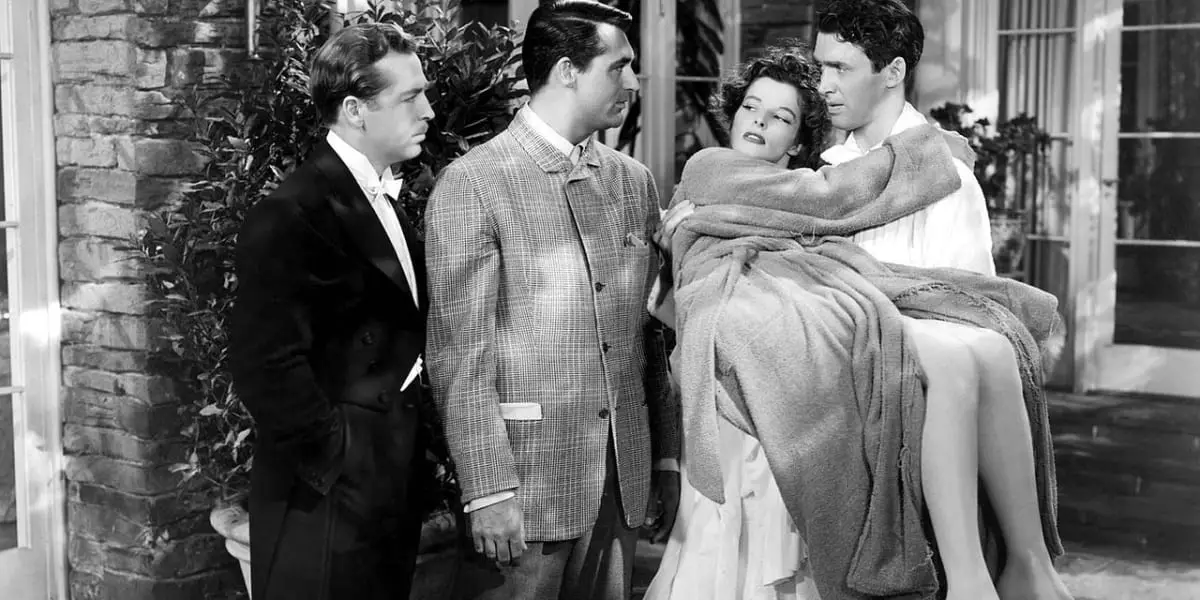
I love classic films for many reasons, one of those being the dialogue. It’s fast-paced, it’s witty, it’s perfectly timed and on-point. It seems to be a quality of the time, and it’s like discovering buried treasure. The acting is nothing short of amazing, and even that is an understatement.
Tracy’s about to marry the wrong man–that’s clear. She’s uptight and needs to loosen up a little; I always appreciated the fact that the film helped audiences understand who she was and where she came from, as that provided insight into why she is the way she is. Tracy does some soul-searching in this film, realizing she’s not the person she sets out to be and allows herself by the film’s conclusion to be more like her real self.
Part of what changes her is she was caught between three men: George (her fiancé), Dexter and Mike. It’s fun to watch her get flustered, yet still attempt to maintain composure around these men. It turns out, Dexter was the one for her all along; though they were once married to one another, both have learned from their mistakes. I truly believe that divine intervention appears when you need it the most; in Tracy’s case, that being Dexter and Mike. Both of their presences force Tracy to take a look in the mirror, to change for the better, and of course, marry the right man. The Philadelphia Story isn’t just about finding love, but also finding a way to better oneself, as well as to love yourself more, and that’s why I love it so much.
P.S. I Love You
This movie is both incredibly romantic and incredibly sad. Still, it’s one of my favorites. Hilary Swank and Gerard Butler play a wonderful couple, Holly and Gerry Kennedy. Gerry passes away due to a brain tumor before the events of the film, but through flashbacks, you get to know both Gerry and Holly, as well as their relationship, over the years. You see the good times and bad times, and even more importantly, you see that despite it all, they love each other deeply.
Their story was romantic from the beginning. Holly’s on a college trip, exploring the world, passing through Ireland when she meets Gerry on the road one day. She keeps his jacket, saying that if they’re meant to be, then they’ll find each other again. Obviously they did, or we wouldn’t have this story, but still, their relationship is one of the most romantic in movie history–at least, to me.
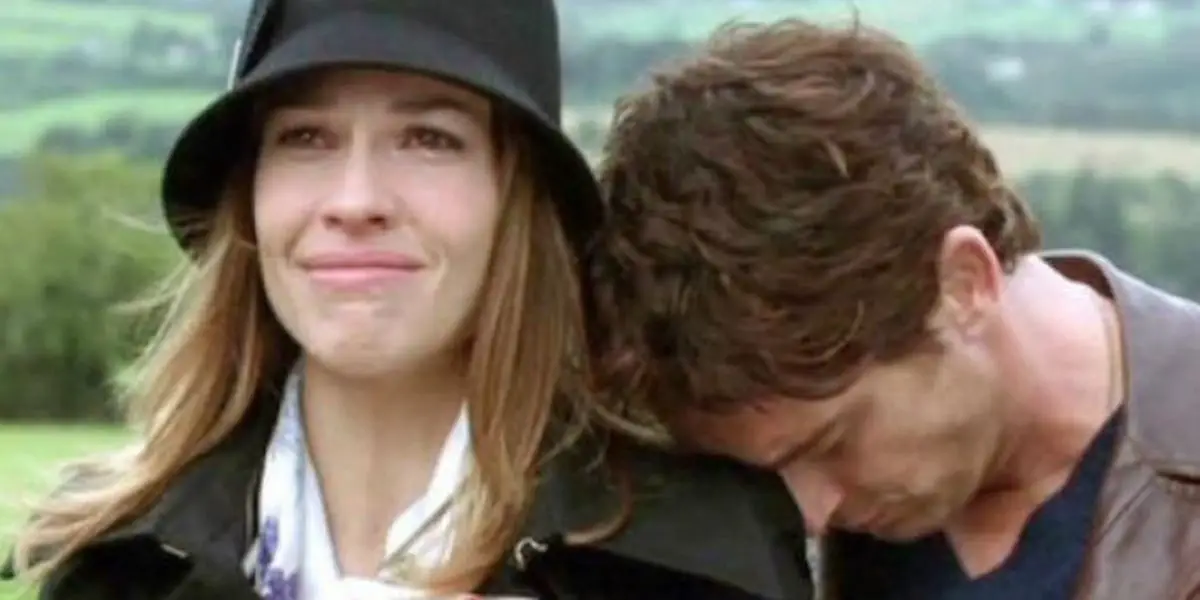
P.S. I Love You brings out my emotions on the strongest and deepest levels. I cry for Holly’s grief, laugh for her joy, feel her despair and celebrate her successes. It’s one of those movies that I can’t help but get invested in, almost becoming one with the character due to the connection I’ve established. It’s tragic because Holly and Gerry’s time together was cut so short; they were robbed of many more happy years together, of starting a family, of following their dreams.
Holly has a helping hand in moving on through Gerry though, as he’s left behind a series of letters, accompanied by adventures, for her. He signs each one with “P.S. I Love You.” His letters may appear to be holding Holly to the past, but it actually moves her forward, getting her out of the house and trying new things, rediscovering herself and finding a way to live her life without Gerry.
The thing about Gerry’s and Holly’s relationship is that they’ll always love one another. Even with Gerry gone, that love still exists. It can’t be broken by death–love is that powerful and meaningful. At the same time, love brings comfort to Holly to help her move on, feel less alone and find her passion in life by combining her love for fashion and art. Gerry is her angel, helping her find her way, just as he did in life, but she’s also making her own path and establishing her next chapter. She can be rest assured that he is always with her and that she has his blessing to move on and be happy.
Foreign lands, eternal love, adventure, moving quotes and a journey of rediscovery…there are so many reasons why I love P.S. I Love You. It makes me believe in the kind of fairytale love that I feel exists–and that I believe comes when you least expect it.

